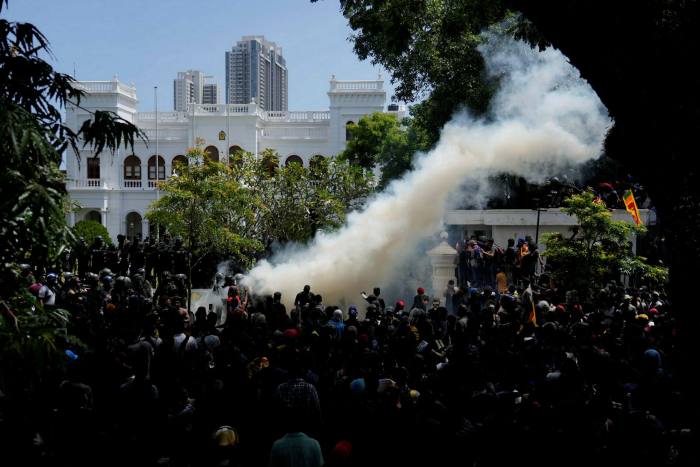President Gotabaya Rajapaksa has fled Sri Lanka on a military aircraft for the Maldives, according to the country’s air force, leaving behind a deepening economic and political crisis in the island nation on a day he was expected to resign in the face of mass protests.
The 73-year-old leader was forced to offer his resignation on Saturday by a street revolt in which tens of thousands of protesters angered by rising prices and shortages of fuel and food converged on Colombo, the commercial capital, and over-ran the presidential palace.
“On government request and under terms of powers available to the president under the constitution, with full approval from the ministry of defence, the president, his wife and two security officials were provided a Sri Lanka air force plane to depart from Katunayake International airport for the Maldives in the early hours of 13 July,” the air force said on Wednesday morning.
Overnight on Tuesday, Rajapaksa and his younger brother Basil Rajapaksa, a former finance minister, had been stopped by immigration officials from boarding commercial flights. “I can confirm to you that he departed last night,” a senior immigration official, who spoke on condition of anonymity, told the Financial Times. “All immigration formalities were fulfilled.”
The official said Rajapaksa’s brother remained in the country. He added: “We have no power to stop the president from leaving, as media have claimed.”
In an address shortly after 1pm, Mahinda Yapa Abeywardena, Sri Lanka’s parliamentary Speaker, said Rajapaksa had named Ranil Wickremesinghe, the prime minister, as acting president in his place.

Under Sri Lanka’s constitution, the prime minister is next in line to succeed the president if he resigns. However, as of early afternoon on Wednesday Rajapaksa had not formally resigned.
“As the president is out of the country, under Article 37(1) he has informed me that Prime Minister Ranil Wickremesinghe has been appointed acting president,” Abeywardena said.
Wickremesinghe is himself a target of protesters’ ire, and previously said he would resign once a new unity government was in place.
Rajapaksa’s downfall marks the end of one of Asia’s most powerful political dynasties, who many Sri Lankans credit with winning a long-running and brutal war against Tamil separatists in the north of the country.
However, they now blame him for borrowing heavily to build Chinese-backed Belt and Road spending projects and for a series of failed economic policies that caused Sri Lanka to default on its debt in May.
Word that Rajapaksa had fled was greeted with jubilation by protesters occupying the palace, who had daubed its walls with graffiti including the slogan “Gota, go home”.
“I am happy that he has left, both as a citizen of this country and as a campaigner,” said Nirmani Liyanage of the Citizens Forum, a civic group that belongs to the Aragalaya (Struggle) movement that has been calling for Rajapaksa’s resignation since April.
She said it was an important development for Aragalaya in their pursuit of “accountability, transparency and participatory democracy” in Sri Lanka.
Wickremesinghe on Wednesday morning declared a national state of emergency and a curfew in Western Province, the most populous subdivision that includes Colombo.
Meanwhile, protesters were gathering around his office and calling for him to resign with chants of “Go home Ranil” and “Go home Gota” (Rajapaksa). Wickremesinghe has promised to step down once a new government is in place.
The president’s flight from Sri Lanka leaves a power vacuum at a time when the country needs to form a new government and secure an IMF financing facility. The agreement would unlock financing for emergency loans that would allow it to import essential goods and make headway on talks to restructure its debt.
After Rajapaksa promised to step down, opposition parties began talks on forming a new government, a step needed to secure an IMF programme.
Sri Lanka’s debt pile stands at $51bn, just over half of which is owed to bilateral and multilateral lenders led by China.
According to the UN World Food Programme, more than 6mn people out of a population of 22mn are “food insecure”, meaning they do not consume enough calories to lead a healthy and productive life.
https://news.google.com/__i/rss/rd/articles/CBMiP2h0dHBzOi8vd3d3LmZ0LmNvbS9jb250ZW50L2FiYWViYmUxLTE0NmItNDY5ZC05MTY3LTQ0MGVmMzViOTVkNdIBAA?oc=5
2022-07-13 08:56:10Z
1485373155
Tidak ada komentar:
Posting Komentar